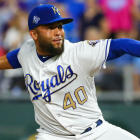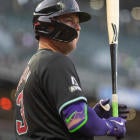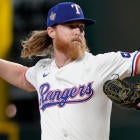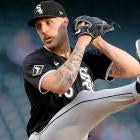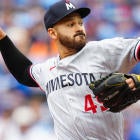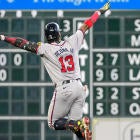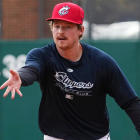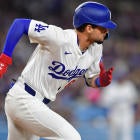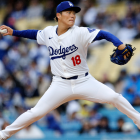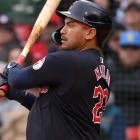More Fantasy Baseball: Domingo German, Freddy Peralta racking up the whiffs
It was only a few days ago that I examined the entire closer landscape, sorting all closers into three distinct tiers while marveling at how teams really do seem to be taking a less traditional approach to the ninth inning.
We've already seen two major changes since then: one in San Francisco, where Hunter Strickland broke his hand and will miss 6-8 weeks, and one in Kansas City, where Kelvin Herrera became the latest victim in what figures to be a complete Royals purge.
Those aren't the only developments, of course. We've seen roles solidified in some places. We've seen them made murky again in others. All in all, it's time to revisit the Bullpen Report. Let's just focus on the eight situations creating the most anxiety.
| Pecking order |
Normally, "pecking order" refers to who's most rosterable in Fantasy Baseball rather than who's in line for the next save, but not wanting to mislead people into thinking Mark Melancon is the designated replacement for Hunter Strickland, I've decided to list him behind manager Bruce Bochy's stated preferences. Ultimately, I think this is the break Melancon needed to work his way back into the role — 6-8 weeks is a long time, after all, and if they hope to make good on their investment still, they'll need to trust his forearm is rehabilitated at some point — but for now, Bochy will go with Sam Dyson, with Tony Watson also in the mix.
Dyson makes sense in the lead role since he throws right-handed and capably filled in for Melancon down the stretch last season, but considering he and Watson have taken turns pitching the eighth inning, the same could conceivably happen in the ninth. It's worth noting Watson has been the more effective of the two this year, having compiled a 1.73 FIP, and has closing experience from his days with the Pirates.
| Pecking order |
What a disaster this bullpen is without Herrera, the last remaining member of the legendary HDH trio. What was once the Royals' greatest strength has now become a glaring deficiency, with no obvious candidates to step up and claim ninth-inning duties. Which leads me to believe no one will.
Let's face it: These Royals aren't winning many games and are liable to win fewer and fewer as they continue to deal off their most valuable assets. Most weeks, they'll probably be lucky to get more than one save chance, and there's no law stating they have to go to the same guy, as teams have demonstrated over and over again this year.
Brandon Maurer got some looks as a closer for the Padres as recently as last year, but has proven to be an ineffective pitcher in his career. Which is why I'm prioritizing Kevin McCarthy, the right-hander who has been semi-effective, even with just 5.6 strikeouts per nine innings. If the Royals decide to go full committee, lefties Brian Flynn and Tim Hill could also get involved.
Of course, the most elegant solution might be to transition Rule 5 pick Brad Keller back from the starting rotation, where he has had a bumpy ride so far, but manager Ned Yost has yet to drop a hint along those lines.
| Pecking order | 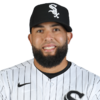 |
I'd be remiss not to comment on Kelvin Herrera's new surroundings, where, at first glance, the most deserving ninth-inning guy might not be so obvious. After all, Sean Doolittle has a 1.71 ERA compared to Herrera's 1.01 mark.
But fear not, Doolittle owners. Your ace closer isn't the odd man out here, manager Dave Martinez confirmed to The Washington Post.
Nor should he be. While Herrera is certainly proven in the role and has done a fine job of preventing runs this season, his 7.4 strikeouts per nine innings suggest he's more vulnerable than Doolittle, whose 43-to-3 strikeout-to-walk ratio gives him the rare sort of FIP (1.62) that actually validates a sub-2.00 ERA.
Still, given that there's now an obvious fallback option should some sort week-long meltdown occur, it wouldn't hurt to handcuff Doolittle with Herrera in leagues where you have spots to play with.
| Pecking order |
Though they flirted with other pitchers in the role, the Phillies never strayed too far from using Hector Neris in the ninth, right up to the point they optioned him to the minors. Now, everything's wide open, and while Edubray Ramos and Victor Arano (who got the first chance Monday and couldn't complete the inning) both have the sort of numbers you'd like to see in the role, I think Seranthony Dominguez will be the reliever getting saves most consistently for the Phillies.
Which isn't to say they'll use him like a traditional closer. I'm imagining more like the way the Brewers used Josh Hader back when Corey Knebel was sidelined by a hamstring injury. They may not earmark Dominguez for the ninth inning, but if they let him finish from whatever point he enters the game, he'll get his share of saves. Two of his three so far were of the multi-inning variety.
And even if that only ends up leading to a dozen or so saves, his 1.61 ERA, 0.58 WHIP and 11.7 strikeouts per nine inning so far suggest he'll matter regardless.
| Pecking order |
If nothing else, the Astros have seemingly narrowed their choices to two, with either Ken Giles or Hector Rondon recording every one of the team's saves since April.
But Rondon has four of the five in June. He also has a 1.67 ERA and plenty of closing experience from his time with the Cubs. So why do I list him second here? Well, manager A.J. Hinch has yet to make any declarations other than to say he won't be making any declarations. Giles recorded a save as recently as June 12 and has yet to actually blow a save. He also has a 1.87 FIP on the year, so there's little doubt he's the Astros most talented reliever even if he hasn't been the most effective so far. Plus, how many times in his three years with the Astros has he forfeited save chances to someone else for a stretch only to reclaim the role in the end?
Don't get me wrong: I wouldn't be counting on Giles for saves right now and don't even know that he's as startable as Rondon. But the fact Rondon entered in the seventh inning of Tuesday's game (and allowed a run, taking the loss) should tell you this situation is anything but straightforward.
| Pecking order |
Just when it appeared the impossible had happened and Mike Scioscia had settled on a singular saves source, Blake Parker had to go and drop the cake, failing to convert in back-to-back appearances last week. He did pick up his eighth save Tuesday, but only after allowing a two-run homer to Paul Goldschmidt. Giving up five earned runs in a span of three appearances won't exactly cement him in the role.
The good news is that Jim Johnson, the most accomplished reliever in the Angels bullpen, just went on the DL with a strained back, so that's one fewer option at Scioscia's disposal. Meanwhile, rookie Justin Anderson, who has also been in the saves discussion thanks mostly to his high strikeout rate, still has an alarming 1.66 WHIP.
But you can't put anything past Scioscia, who has been as capricious with this role as any manager over the past couple years.
| Pecking order |
Things had seemingly settled down at the back end of the Blue Jays bullpen until Saturday, when Tyler Clippard unexpectedly re-entered the saves mix. It'd be one thing if Ryan Tepera was unavailable, having gotten too much work as the team's newly anointed closer, but no: He had thrown just 14 pitches the day before and had worked just twice in a seven-day span.
I wish I knew the thinking behind it, but it doesn't seem to have disrupted things too much. Clippard entered in the eighth inning the next day and coughed up the lead. Tepera recorded the game's final four outs, during which the Blue Jays reclaimed the lead. No save to show for it, but it's how a home team would typically use a closer late in a tie game.
He's not great, but Tepera appears to be the best the Blue Jays have right now. And apart from that unexplained Clippard save Saturday, they seem to know it.
| Pecking order |
After blowing a couple saves at the start of June, Bud Norris appears to have settled down again, and his job isn't in immediate jeopardy. But now that rookie Jordan Hicks, who has surpassed Aroldis Chapman as the hardest thrower in baseball, has a breaking ball to pair with that fastball, Norris will always be looking over his shoulder. Hicks is still averaging just 7.3 strikeouts per nine innings, but he has 23 strikeouts in 17 1/3 innings over his past 14 appearances.
If you're in a league where all closers are owned and are looking to speculate on the next saves source, he has to be near the top of the list.


































